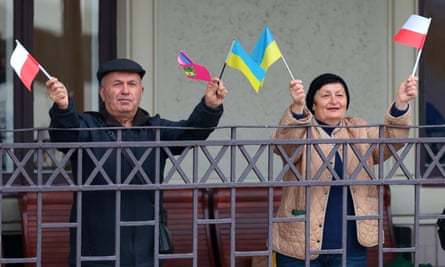Preliminary results suggest Poland is heading for a new government run by Donald Tusk. The change, after eight years of populist rule by the Law and Justice (PiS) party, would be a remarkable political reversal. A potential Tusk government may be restricted in its legislative manoeuvres by the veto of PiS-aligned president, Andrzej Duda, in office until 2025, but would nonetheless radically change Poland’s domestic and foreign policy landscape.
From warmer relations with Brussels and Kyiv, to a relaxation of some of Europe’s strictest abortion laws and the advent of same-sex civil partnerships, we take a closer look at what this new era might look like both at home and abroad.
Relations with Europe

People wave Polish and EU flags outside a TV studio before an election debate debate earlier this month. Photograph: Wojtek Radwański/AFP/Getty
Poland’s epic fallout with Brussels and other western partners has been slightly less noticeable over the last 18 months due to Warsaw’s leading place in the pro-Ukraine western coalition, but politicians in many European capitals will be happy to see the back of PiS.
Over the past eight years, the government has clashed with Brussels over rule of law concerns, leading to tens of billions of euros of European funds earmarked for Poland being frozen. In turn, PiS made attacks on the EU and Berlin a key part of its electoral campaign. One PiS campaign ad featured an invented scene of a frustrated German diplomat trying to give orders to the Polish government “like it was under Tusk”, only to be firmly rejected by PiS chairman Jarosław Kaczyński.
While Tusk is not the German puppet PiS has claimed, he will certainly provide a more familiar and friendly face to Poland’s European partners, many of whom know him well after his five-year stint as European Council president.
“Poland under the new Tusk government will be a more constructive player in EU politics, seeking to mend relations with key partners and restore trust in its pro-European credentials,” said Piotr Buras, head of the Warsaw office of the European Council on Foreign Relations.
However, Buras noted that there would be a strong and probably vocal rightwing opposition in the provisional new parliament, meaning “European policymaking will be the subject of a polarised political debate which will limit the government’s room for manoeuvre”.
Rule of law

Judge Mariusz Czajka holds a statue of Themis during a September protest in front of a court in Kraków in support of judicial independence in Poland. Photograph: Beata Zawrzel/NurPhoto/Shutterstock
Over the past eight years, PiS has attempted to install political appointees in various supposedly neutral bodies, most notably courts and legal institutions. Reversing this politicisation has been one of the key promises of the opposition during the election campaign.
“I think it’s extremely important to put forward a new vision of Poland in which the rule of law and the constitution are respected,” said Adam Bodnar, Poland’s former human rights ombudsman, who stood for election to the senate, the upper house of parliament, from Civic Coalition.
Bodnar said returning the judicial system to normality would be difficult “under pressure of hijacking from the president and the constitutional court”, which has been packed with PiS appointees, and that the new government would have to be clever and flexible. “It will be like a chess game,” he said in an interview before Sunday’s vote.
The new government would also need to decide to what extent it wants to prioritise potential criminal cases for abuses of power during the PiS years.
Women’s rights

Members of the public listen to Donald Tusk delivering a speech during a Women for Elections campaign rally on 10 October in Lodz. Photograph: Omar Marques/Getty Images
Throughout the campaign, Tusk has been unequivocal about his support for relaxing the draconian abortion restrictions introduced by PiS. He has faced criticism from some feminist activists for not going far enough and allowing people with historical anti-abortion positions into his Civic Coalition, but Tusk has insisted that the legalisation of abortion up to 12 weeks would be a priority for a government led by him.
“Abortion is a woman’s decision, not a priest’s, prosecutor’s, policeman’s or party activist’s. And we have written it down as a specific project, we will be ready to propose it to the Sejm on the first day after the next parliamentary elections,” he said in the spring.
Whether Tusk would be able to secure a majority for such a move in the parliament, given the more conservative views of some of the members of Third Way, a potential governing partner in a broad opposition coalition, remains to be seen. There is also the issue of Duda’s veto.
Nevertheless, asked on Sunday night what a new government would mean for Polish women, Civic Coalition MP Barbara Nowacka said: “Safety. Finally, safety. Young women won’t be afraid to get pregnant, young women won’t be afraid to go to the doctor.”
LGBTQ+ rights

People attend a WarsawPride and KyivPride march in Warsaw, Poland on 25 June 2022. Photograph: Wojtek Radwański/AFP/Getty
Under PiS, hate speech against LGBTQ+ people has been tolerated and even encouraged. Although it did not feature heavily in the current campaign, the PiS-aligned Duda fought his 2020 presidential campaign on a platform of fighting so-called “LGBT ideology”, which he called more dangerous than communism. Several municipalities set up so-called “LGBT-free zones”, declaring themselves free of the supposed “ideology”.
The messaging has had an effect – in a 2019 survey, when asked to name the biggest threat to Poland, the most popular answer among Polish men under 40 was “the LGBT movement and gender ideology”. Its absence from this more recent election campaign, however, hints that PiS understood that Polish society was changing and that the demonisation of LGBTQ+ people was no longer a sure vote-winner.
Tusk has said a legal bill to introduce same-sex civil partnerships will be a priority for the new government, despite being controversial among conservative Poles and even some elements of his own coalition.
“I know that this is the first step and still not popular in various circles, but we have to show that in matters of dignity, there can no longer be a purely political calculation that, for example, it is not beneficial to make a decision because it won’t have the support of the majority,” Tusk said in June.
Relations with Ukraine

A man and woman wave miniature flags of Ukraine and Poland at the Rava-Ruska station during the launch of train route connecting Lviv and Warsaw at the weekend. Photograph: Ukrinform/Shutterstock
The PiS government was one of the earliest and most vocal supporters of Ukraine, with fear of Russia and support for Kyiv one of the few issues that united most of Poland’s polarised society.
However, in recent months, as “Ukraine fatigue” sets in among a growing minority of Poles, PiS toughened its rhetoric, partly to avoid haemorrhaging support to the far-right Confederation, which was openly anti-Ukrainian. This saw president Duda compare Ukraine to a “drowning person” last month, and the prime minister, Mateusz Morawiecki, announced a halt to arms deliveries to Kyiv amid a spat over grain exports.
Civic Coalition has pledged to maintain support for Ukraine and has criticised PiS for its recent words about Poland’s eastern neighbour.
Shaun Walker is the Guardian's central and eastern Europe correspondent. Previously, he spent more than a decade in Moscow and is the author of The Long Hangover: Putin's New Russia and the Ghosts of the Past


Spread the word